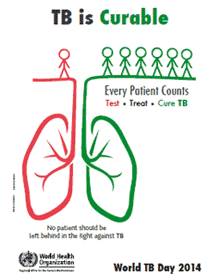 TB is curable. World TB Day 2014 is a call to find, treat and cure TB18 March 2014 - “Find…treat…cure tuberculosis (TB) patients” is the call of this year’s World TB Day, due to be marked globally on 24 March 2014.
TB is curable. World TB Day 2014 is a call to find, treat and cure TB18 March 2014 - “Find…treat…cure tuberculosis (TB) patients” is the call of this year’s World TB Day, due to be marked globally on 24 March 2014.
Under the slogan ‘Each patient counts’, WHO in the Eastern Mediterranean Region is calling this year for legislation on TB notification to be updated so that all cases of TB can be found and treated.
World TB Day 2014 also calls on countries to accelerate progress towards zero TB deaths, infections, suffering and stigma. One of the key messages of the day is that TB is curable, but more efforts are needed from all parties to find, treat and cure everyone who gets ill with the disease.
“Countries in the Region have built strong national TB programmes with sound strategic plans of action. The Stop TB strategy has been successfully implemented, and the Region has maintained a high treatment success rate among cases, at around 88% for the past 5 years.
In the past 10 years, countries have detected more than 4.2 million TB cases, and have successfully treated more than 3 million of these. Deaths from TB have fallen by 50% compared to 1997” says Dr Ala Alwan, WHO Regional Director for the Eastern Mediterranean, on the occasion of World TB Day.
Still more actions need to be discussed widely at country level to reach a national consensus that is reflected in updating public health law (TB notification on the spot is obligatory) and agree on the related mechanisms and tools for its implementation and to conduct awareness campaigns, national conferences, media interventions to gather support and understanding of the need.
Of the 9 million people a year who get sick with TB worldwide, a third of them are “missed” by public health systems. Many of these 3 million people live in the world’s poorest, most vulnerable communities.
In the Eastern Mediterranean Region, the situation is the same: the case detection rate is only 63% (Global TB report 2013). This means that out of the 670 000 new TB cases estimated to have occurred in 2012, around 250 000 cases were missed.
Almost two thirds of TB cases among women in the Region in 2012 were not detected. This means that the access of women to diagnosis is much less than that of men.
World TB Day, falling on 24 March each year, aims to build public awareness of the burden of tuberculosis, which today remains an epidemic in most parts of the world, resulting in the deaths of nearly 1.5 million people each year, mostly in developing countries.
It commemorates the day in 1882 when Dr Robert Koch astounded the scientific community by announcing that he had discovered the cause of tuberculosis: the TB bacillus.
This requires countries to aggressively scale up TB programmes and ensure access and coverage for all, especially for the most vulnerable groups in the so-called TB ‘hotspots’: those areas most heavily affected by the disease.
Worldwide and in the Region, one of the key actions that has not yet been undertaken is to update public health legislation to ensure that all cases of TB are notified to the national health system as soon as they are diagnosed. “Many countries in the Region have not revised the relevant public health laws since early in the 20th century but a supportive legislative environment has a major role to play in ensuring and documenting the contribution of every partner in the health system.” Dr Alwan noted.
There is a need to invest in basic research and development for new tools – diagnostics, drugs and vaccines – in order to reach people faster and treat them quicker. Notification of cases needs to take place under conditions of strict confidentiality, and should not impede the right of patients to decide who will treat them.
____________
 World TB Day 2014 Advocacy Materials
World TB Day 2014 Advocacy Materials
Contacts
Media and Communications programme
Tel: 202 22765020/021
email:
Stop TB programme
Tel: 20222765259
email:


